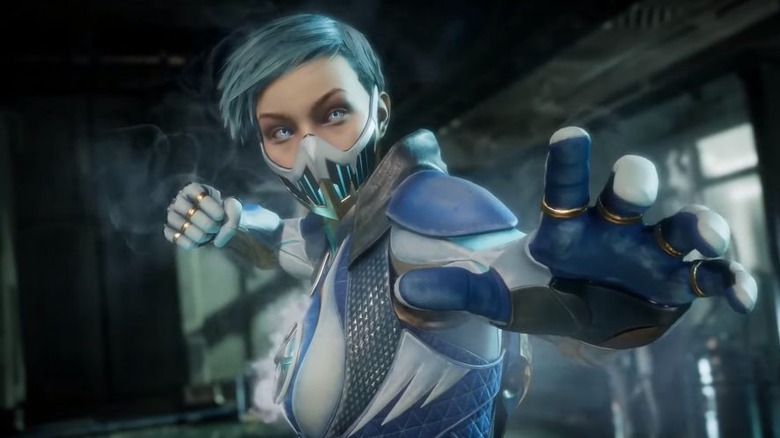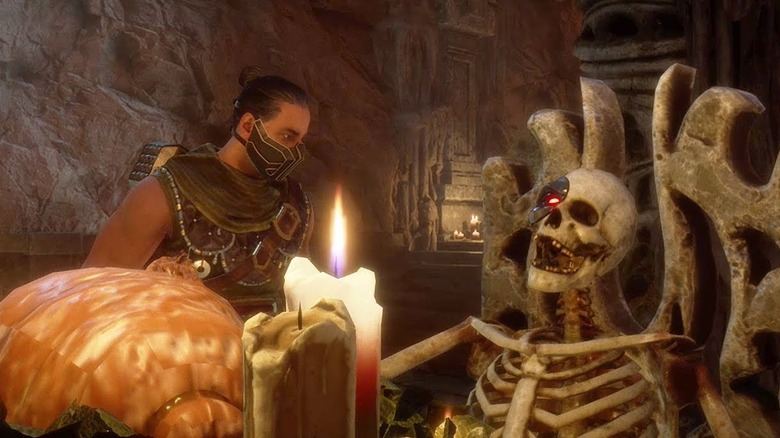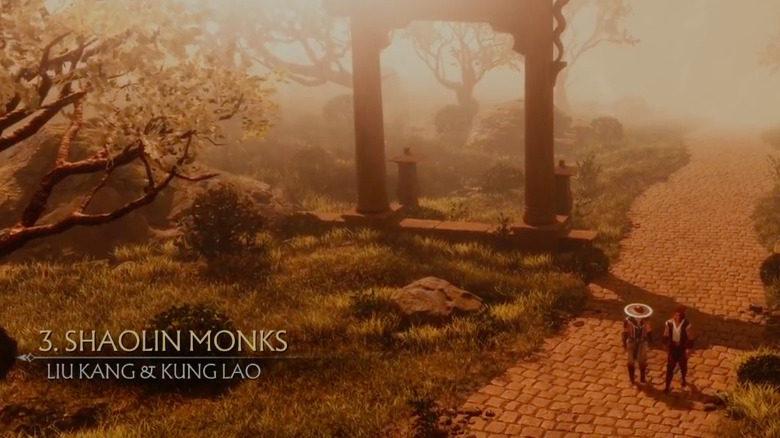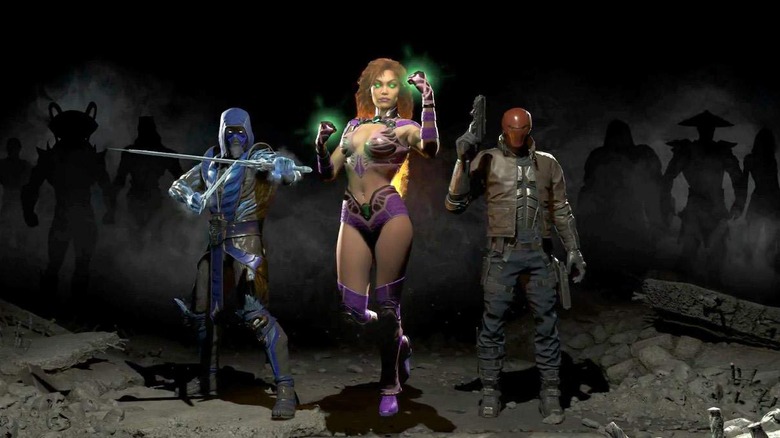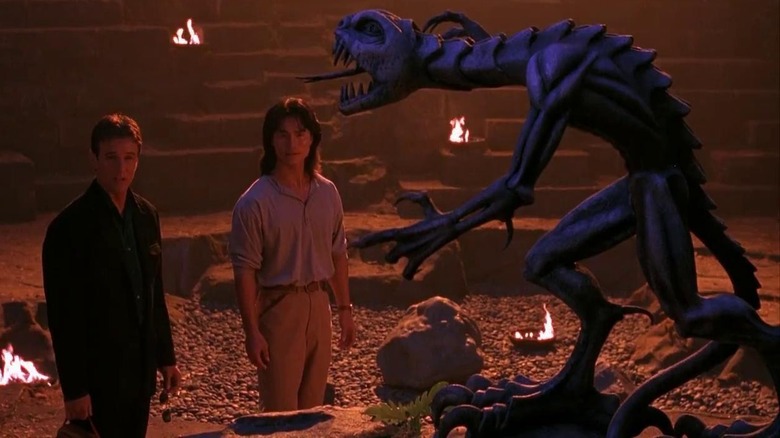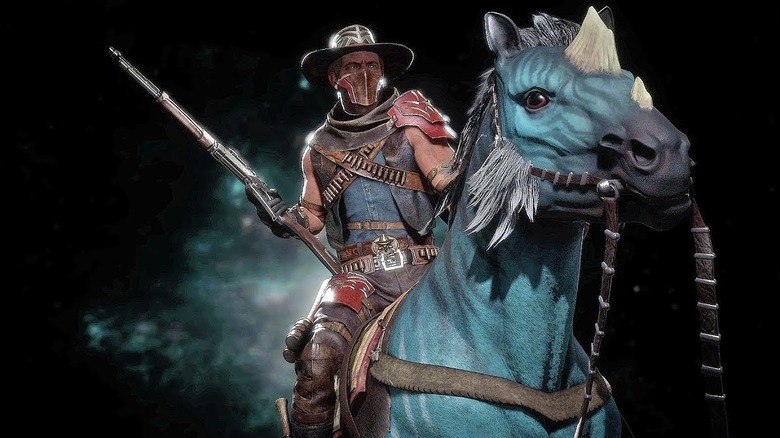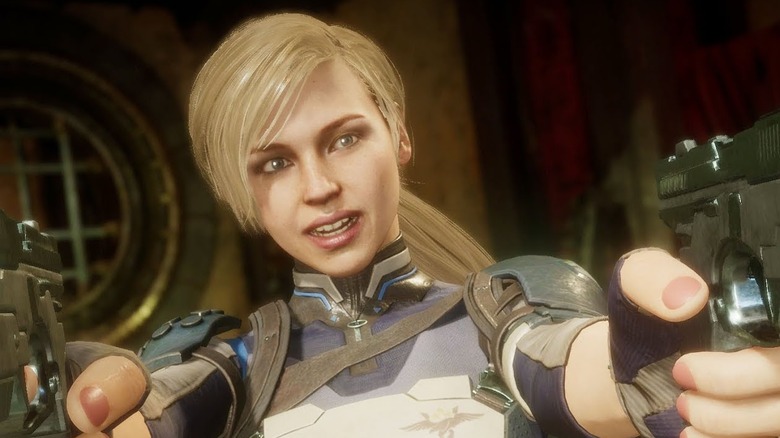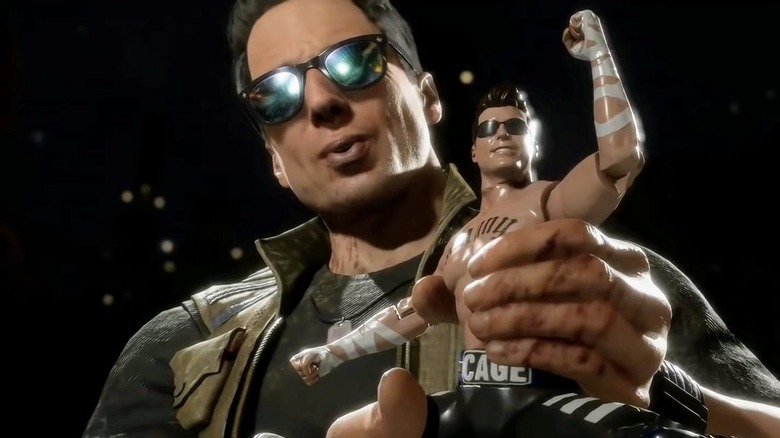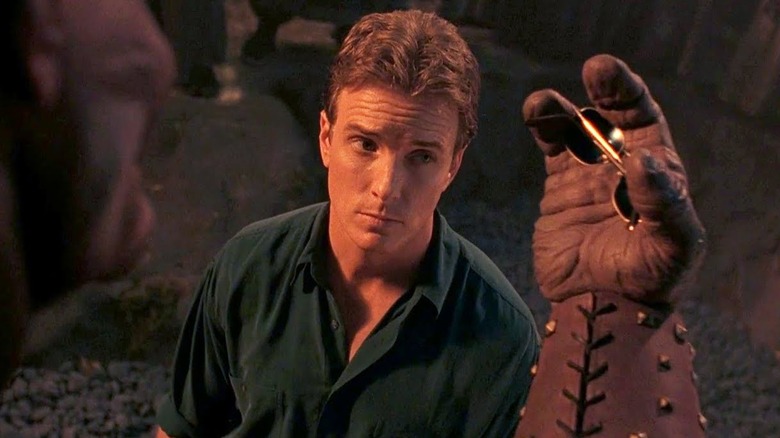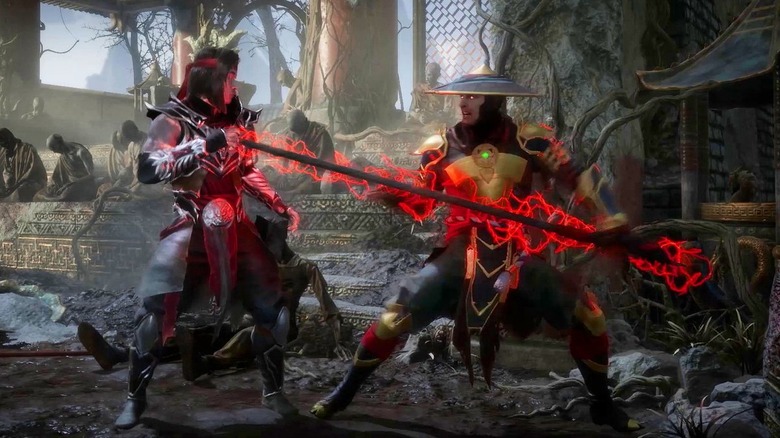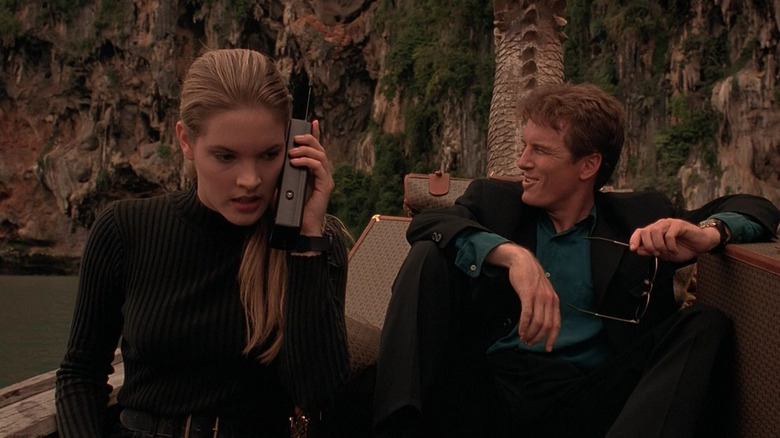Small Details You Missed In Mortal Kombat 11
Mortal Kombat 11 is finally out, and it's the gross-out crowd-pleaser that fans had been hoping for. Continuing on with the time-bending, reality-changing plot of the last few entries, MK11 introduces some brand new fighters and forwards the lore of the series. However, some of the best bits of the game may not be quite so obvious at first glance. In fact, Mortal Kombat 11 is chock-full of Easter eggs, pop culture references, and callbacks to previous games and films in the franchise.
The Mortal Kombat franchise has a wealth of mythology to explore, so many of these fun secrets are super easy to miss. Some can be found in the game's Krypt mode, which takes the form of an exploration of Shang Tsung's private island. Others may be hidden in victory animations or character intros during matches. It's time to test your might (and your eyesight) and take a closer look at some of the very best of the little gems sprinkled throughout Mortal Kombat 11.
RIP Kano
One of the sections of the Krypt is Goro's Dining Hall. From the looks of this place, there hasn't been much eating, drinking, or merrymaking in this room in quite some time. To top it all off, there's a skeleton sitting at the head of the dining table. However, given that this is Shang Tsung's island, finding corpses lying around isn't exactly anything new. Still, if you get a little closer and look at the side of the skeleton that has been facing away from you, the poor soul's identity will become clear. That unmistakable glowing red eye should tip you off that this corpse belongs to none other than Kano, a criminal from the dreaded Black Dragon crime syndicate who made his first appearance way back in the original Mortal Kombat.
Not only that, but his placement here in the dining hall is a direct reference to a memorable sequence from the 1995 live action Mortal Kombat film adaptation. In particular, it's from a scene where Kano eats his fill at a large banquet table before meeting Shang Tsung's prize fighter, Goro, for the very first time; even the giant, ornate chair has the same design. Though Kano survived this tense dinner in the film and went on to meet his end in battle with Sonya Blade, this gives us a pretty good idea of what it could have looked like if he hadn't been quite so "lucky."
A Song of Ice and Fire and Monks
The third chapter of Mortal Kombat 11's story mode, which focuses on the pair of Kung Lao and Liu Kang, is entitled "Shaolin Monks." This is in reference to the PlayStation 2 and Xbox game of a similar name, which likewise starred Kung Lao and Liu Kang. Mortal Kombat: Shaolin Monks was a third-person action game that mixed beat-em-up mechanics with the more classic combos and special moves that the franchise is known for. Despite some odd story decisions, some of which contradicted the events of Mortal Kombat 2, the game received pretty decent reviews.
There was actually a planned follow-up to Shaolin Monks from the same team, a co-op game called Mortal Kombat: Fire & Ice. This installment, which would have starred eternal enemies Sub-Zero and Scorpion, was canceled early in its development due to budgetary concerns. This brings us to our next referential chapter title: after Kung Lao and Liu Kang's section, MK11's fourth campaign chapter is subtitled "Fire & Ice," which follows none other than Sub-Zero and Scorpion. It's nice to see the spinoffs getting some love, just as long as no one mentions Special Forces.
Injustice remembered
At this point, the Kombatants of MK and the colorful characters of the DC Universe have a pretty substantial history of butting into one another's realities. 2009's Mortal Kombat vs DC Universe saw the characters of both universes team up against Dark Kahn, a bizarre mashup of Outworld's Shao Kahn and DC Comics' Darkseid. Though the heroes and villains of the DCU were the main focus of NetherRealm's Injustice: Gods Among Us and its sequel, some of our favorite Kombatants got involved with the fight against Superman and Brainiac via DLC. Scorpion was released as a DLC fighter for Injustice, while Injustice 2 brought in Raiden and Sub-Zero ... which brings us to our next fun Easter egg.
In Mortal Kombat 11, Raiden and Sub-Zero may reference their experiences in the Injustice reality when pitted against one another. Raiden says that he has been having dreams of an "unjust world," while Sub-Zero refers to "a dark knight and a caped wonder," a clear nod to Batman and Superman. Raiden seems shocked and disturbed that Sub-Zero seems to share his "dream," his mood in stark contrast to fans who should be amused to catch this quick, clever nod to the Injustice franchise.
The strange case of Movie Reptile
One of the more curious aspects of the first Mortal Kombat film was how it went about bringing the ninja Reptile to the screen. In the movie, Reptile is seen as a hissing, bipedal, seemingly-mute, computer-animated lizard (it was the '90s, you guys). This version of Reptile could also turn itself invisible, so naturally Shang Tsung sent it to spy on the participants of the tournament. In the last act of the movie, Reptile gets forcibly absorbed by a statue (don't worry; it doesn't really make sense in the movie itself, either), after which it morphs into the green-clad ninja more familiar to fans of the video game and gets into a dust-up with Liu Kang, all backed by a techno musical score (again, it was the '90s).
In the Krypt, there are several different areas where Reptile can be found, but the first of these spots references his bizarre appearance from the film. Though it's hard to make out at first, you can find a transparent statue that shares Movie Reptile's design. A cutscene can be triggered in which the statue fades into view right before Reptile himself appears in his ninja form, letting out an aggressive hiss before running off. This is another fun example of Mortal Kombat 11 paying tribute to the film, while still maintaining the mystery and atmosphere of the Krypt.
Pop culture references in mirror matches
One of the odd little joys afforded to players who enjoy fighting games like Mortal Kombat or the Street Fighter series is the concept of mirror matches, wherein the player character will go up against a version of themselves. It's always fun to see Kombatants taunting one another's doubles, but a few of these mirror matches result in dialogue referencing major pop culture touchstones.
For example, when pitting Frost against Frost, the two cybernetic ninjas may literally recite some of the lyrics to "Let It Go," the Oscar-winning, inescapable earworm of a song from Disney's Frozen. With her icy powers, it's fitting that Frost would slyly quote the ultimate animated frost queen.
Another fun reference can occur when the evil wizard Noob Saibot goes up against an identical counterpart. In this one, Noob will refer to himself as "He Who Shall Not Be Named," a reference to Lord Voldemort, the main antagonist of the Harry Potter series. The other Noob will then tell his dopplegänger, "Return to your Deathly Hallow," which is, of course, a nod to the book Harry Potter and the Deathly Hallows.
These are both silly, but amusing references that may come across as run-of-the-mill taunts to players who aren't aware of what they mean. For those in the know, however, it's good to know that our favorite Kombatants are apparently making the time to kick back and enjoy a movie or two.
Erron Black's latest bounty
First introduced in the Mortal Kombat X comic book series before stepping into the ring in the MKX game, Erron Black is a bounty hunter serving the forces of Outworld. His Western-themed attire makes Black instantly stand out from the rest of the Kombatants. Meanwhile, Hsu Hao, who first appeared in Mortal Kombat: Deadly Alliance, is a high-ranking member of the criminal Red Dragon clan, the mortal enemies of Kano's Black Dragon family. At some point, Erron Black and Hsu Hao met ... and it did not go well for one of them.
In one of Erron Black's intro animations, he will walk on screen with a big brown bag. Black will chuck the bag onto the floor and a man's severed head will roll out. Next to where the head rolls to a stop, you can see what is unmistakably Hsu Hao's hat. Whether or not we'll ever see the confrontation that led to this turn of events, either in video game or comic book form, it appears that his end was a quick one.
Cassie Cage has connections
It seems that Cassie Cage, the daughter of mainstay Kombatants Sonya Blade and Johnny Cage, has quite a few connections, if her intro animations are to be believed. When Cassie enters the ring, she's almost always seen texting someone, with the incoming and outgoing messages popping up next to her on the screen. Two of these conversations in particular are pretty fun references that are easy to miss.
The first comes from a conversation about Raiden. When asked if she's sure she can best him in battle, Cassie replies with a dismissive playing card emoji. This particular card is a joker, which carries a double meaning. Not only is she essentially saying that Raiden's fighting prowess is laughable, but this is a clever nod to another notable role of Richard Epcar, Raiden's voice actor. Namely, Epcar voiced Batman's arch-nemesis the Joker in Mortal Kombat vs DC Universe, as well as both Injustice games.
Another intro has her texting "Ronda," which is clearly a reference to Ronda Rousey, the much-publicized new voice actress for Sonya Blade. That's right, Cassie knows her mom's real life performer. Their conversation involves Cassie making a joke about Ronda being her new promoter. Come to think of it, Cassie's devil may care attitude would probably fit right in at the WWE.
You've got a friend in Johnny Cage
As a Hollywood superstar, Johnny Cage is no stranger to references related to his profession. Heck, the character's original design and backstory was even loosely based upon the Belgian badass and master of epic splits, Jean-Claude Van Damme. When it comes to Johnny Cage, no joke is too lame and no Easter egg is too silly. However, Mortal Kombat 11 contains one in particular that serves as a strange bit of family-friendly crossover for the ultra-violent franchise.
As part of some of his different victory poses, Johnny Cage will brandish an action figure made in his likeness. If you look very closely, you'll notice that "Cassie," the name of Johnny's daughter, is written on the bottom of the action figure's foot. This is a reference to the Toy Story films, where Woody and the other toys owned by the character Andy have his name written on one of their feet. It's such an oddly cutesy reference for a video game (and character) that allows players to kick a guy so hard in the groin that his spine rockets into the air.
Just leave Johnny's sunglasses alone
One of Johnny Cage's Brutality finishing moves is called "$500 Sunglasses." In this Brutality, Johnny will chuck a pair of sunglasses onto his opponent's face. In a move reminiscent of James Bond, these sunglasses are actually a small bomb, which detonates and obliterates the opponent's head in a spurting geyser of blood. It's a hilariously over the top finishing move that is right in line with Johnny's "more is more" attitude. This move is also yet another easy to miss nod toward a moment from the first Mortal Kombat movie.
In the last act of the film, after seeing Goro easily work his way through dozens of challengers, Johnny is matched up agains the four-armed warrior. Goro begins the match by taking Johnny's sunglasses right off his face and crushing them in his hand. Right before laying the smackdown on Goro, Johnny admonishes the Shokan warrior for breaking his shades, saying, "Those were $500 sunglasses, a**hole." He then proceeds to knock Goro off a cliff, a fitting end for a creature who dared to kill Johnny Cage's friends and mess with his stuff. For players who aren't familiar with the movie, "$500 Sunglasses" is just another special move, but for longtime fans, it's a great little reference to this crowd-pleasing one-liner.
Liu Kang and Raiden are total name-droppers
The story of 2011's Mortal Kombat reboot involved a desperate Raiden sending a message to the past in an attempt to prevent the complete conquest of Earthrealm. This move essentially undid the events of the last several installments of the series and created a new timeline for future stories to follow. However, that doesn't mean that the writers have completely forgotten the retconned entries. One of the cheekier exchanges of dialogue in Mortal Kombat 11 actually manages to pay tribute to a few of these original timeline tournaments.
The reference in question can occur during a match intro between Liu Kang and Raiden. After flipping onto the scene, Liu Kang asks, "Are we the deadly alliance?" Raiden responds, "That is Kronika's deception," to which Liu Kang counters, "Or a recipe for Armageddon."
These back and forth lines, while somewhat awkward in the context of the conversation, are in fact a nod to the Mortal Kombat games Deadly Alliance, Deception, and Armageddon. Raiden's time-altering shenanigans ensured that the events leading to Armageddon never occurred. For now, they merely exist as a fun little nod toward the series' past.
Johnny admires Sonya
There are a surprising number of references to the Mortal Kombat movie adaptation in MK11. This one in particular recalls a funny exchange between Liu Kang and Johnny Cage. During a matchup between the two longtime Kombatants in Mortal Kombat 11, you may hear a tongue-in-cheek conversation wherein Johnny praises Sonya Blade's "strategic mind." Liu responds by correcting Johnny, saying, "It's not her mind you're admiring."
Players may mistake this simply as Liu's way of ribbing Johnny for being a bit of a pig when it comes to the ladies (which it is), but this dialogue is taken nearly verbatim from the movie. In the case of that scene, the exchange comes right after Sonya decides to investigate what's really going on behind the scenes of Shang Tsung's tournament. As Johnny watches her walk away, he remarks, "You know, you gotta admire her. When she sets her mind on something ...," trailing off before Liu claps back with the same remark as in MK11. It's a really sly reference that comes off as perfectly natural dialogue within the context of the game, but should earn a smile from folks who recognize it from the movie. At least it sounds less clunky than the Deadly Alliance/Deception/Armageddon dialogue.

